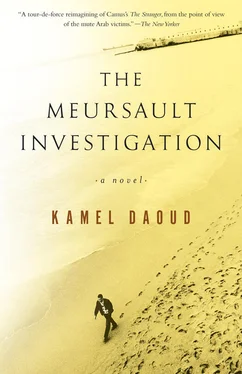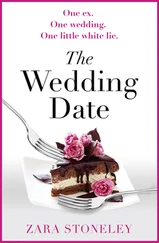I sometimes thought about poking around that beach at the exact hour of the crime. That is, during the summer, when the sun’s so close to earth it can make you crazy or drive you to shed blood, but that would be a futile exercise. Besides, the sea bothers me. I’m definitively afraid of the water. I don’t like to go swimming — the waves swallow me up too fast. “Malou khouya, malou majache. El b’har eddah âliyah rah ou ma wellache.” (Where is he, my brother, why didn’t he come back? The sea took him from me, he never came back.) I love that old song. It’s a local tune. A man sings about his brother, who was swept out to sea. I’ve got several images in my head, but I think I’ve been drinking a bit too fast. The truth is, I’ve actually done it. Six times … Yes, I went there six times, there to that beach. But I never found anything, no empty cartridges, no footsteps, no witnesses, no dried blood on the rock. Nothing. I looked for years. Until one Friday, ten years ago, more or less, the day when I saw him. Under a rock, a few meters from the water, I suddenly saw a silhouette that merged with a dark wedge of shadow. I’d walked on the beach for a long time, as I recall. I intended to get knocked out by the sun, to suffer sunstroke or a fainting spell and thus relive to some degree what your author describes. And I admit it, I’d also had a lot to drink. The sun was overwhelming, like a heavenly accusation. It shattered into needles on the sand and on the sea but never ever flagged. At one point, I had the impression of knowing where I was going, but that impression was surely mistaken. And then, down at the end of the beach, I spotted a tiny spring flowing in a trickle over the sand behind the rock. And I saw a man , dressed in overalls and nonchalantly lying there. I looked at him with fear and fascination; he seemed to barely notice me. One of us two was an insistent ghost, and the shadow — very deep, very black — had the coolness of a threshold. Then … then it seemed that the scene veered off into some sort of amusing delirium. When I raised my hand, the shadow did the same. And when I took a step to the side, it turned and changed its resting point. Then I stopped, with my heart pounding, and I realized I had my mouth hanging open, like an idiot, and no weapon, not even a knife. I was sweating profusely, the big drops burning my eyes. No one was around, and the sea was mute. I knew for sure I was looking at a reflection, but I had no idea of what! I groaned out loud, and the shadow flickered. I took a backward step, and the shadow did the same, in a kind of weird contraction. I found myself stretched out on my back, shivering with cold, bludgeoned by bad wine. I’d walked backward about ten meters before collapsing in tears. Yes, I assure you, I wept for Musa years after his death. My efforts to reconstruct the crime at the scene where it had been committed were leading me to an impasse, to a ghost, to madness. All of which is to tell you there’s no point in your going to the cemetery, or to Bab-el-Oued, or to the beach. You won’t find anything. I’ve already tried, my friend. I told you right from the start: This story takes place somewhere in someone’s head, in mine and in yours and in the heads of people like you. In a sort of beyond.
Don’t do any geographical searching — that’s the point I’m trying to make.
You’ll get a better grasp on my version of the facts if you accept the idea that this story is like an origin myth: Cain comes here to build cities and roads, and to domesticate people and soil and plants. Zujj is the poor relative, loafing in the sunshine, his whole attitude so lazy it’s evident he owns nothing, not even a flock of sheep, that could arouse envy or motivate murder. In a certain way, your Cain killed my brother for … nothing! Not even for his livestock.
We should stop here. You’ve got enough material to write a good book, no? The story of the Arab’s brother. Another Arab story. You’re hooked …
Ah, the ghost, my double … see him there, behind you, holding his beer? I’ve been taking note of his maneuvers. He’s getting progressively closer to us, ever so casually. A real crab, that one. The ritual is always the same. He spreads out his newspaper and reads it diligently during the first hour. Then he cuts out articles and news items — relating to murders, I think, because I once took a look at what he’d left on the table. Next he looks out the window and drinks. Then the contours of his silhouette get blurry and he himself becomes diaphanous and almost fades away. Like a reflection. You forget he’s there, you hardly step around him when the bar’s crowded. No one’s ever heard him speak. The waiter seems to guess what he wants to order. He’s always wearing that same old jacket, worn at the elbows, and the same bangs on his big forehead, and his look is always the same, intelligent and cold. And let’s not forget the cigarette. His eternal cigarette, connecting him to heaven by the fine coil of smoke twisting and rising above him. He’s hardly ever looked at me, despite the years we’ve been neighbors in here. Ha, ha, I’m his Arab. Or maybe he’s mine.
Good night, my friend.
I used to love stealing the bread Mama hid on top of the armoire and then watching her look all over for it, muttering curses the whole time. One night a few months after Musa’s death, when we were still living in Algiers, I waited until she fell asleep, swiped the key to the trunk where she kept supplies, and ate almost all the sugar. The next morning she panicked, she was grumbling to herself, and then she started scratching her face with her fingernails and wailing about her plight: a husband vanished, a son killed, and another son observing her with an almost cruel joy in his eyes. Well, yes! I remember that, I remember feeling a strange jubilation at seeing her really suffering for once. To prove my existence, I had to disappoint her. It was like fate. That tie bound us together, deeper than death.
One day Mama wanted me to go to the neighborhood mosque, which served more or less as a day-care center, supervised by a young imam. It was summer, and the sun was so harsh Mama had to drag me into the street by my hair. I struggled like a maniac and managed to get free of her. Then I shouted an insult and, still holding the bunch of grapes she’d tried to coax me with just a minute or two before, I ran away. I ran until I tripped and fell and the grapes got completely crushed in the dust. I cried my eyes out and ended up going to the mosque, all contrite. I don’t know what came over me, but when the imam asked what was causing me such grief, I accused another kid of hitting me. I think that was my first lie. My own personal version of eating the forbidden fruit. Because from then on, I became wily and deceitful, I started to grow up. Now, that first lie of mine, I told it on a summer day. Just like your hero the murderer — bored, solitary, examining his own tracks, spinning his wheels, trying to make sense of the world by trampling the bodies of Arabs.
Arab . I never felt Arab, you know. Arab-ness is like Negro-ness, which only exists in the white man’s eyes. In our neighborhood, in our world, we were Muslims, we had given names, faces, and habits. Period. The others were “the strangers,” the roumis God brought here to put us to the test, but whose days were numbered anyway: One day or another, they would leave, there was no doubt about that. And so nobody responded to them, people clammed up in their presence, leaned on the wall, and waited. Your writer-murderer was wrong, my brother and his friend had no intention whatsoever of killing them, him and his pimp friend. They were just waiting for them to leave, all of them, your hero, the pimp, and the thousands and thousands of others. We all knew it, we knew it from early childhood, we didn’t even need to talk about it: We knew one day they’d eventually leave. When we happened to pass through a European neighborhood, we used to amuse ourselves by pointing at the houses and divvying them up like spoils of war. One of us would say, “This one’s mine, I touched it first!” and set off a frenzy of claims and counterclaims. We were five years old when we started doing that, can you imagine? As if our intuition was telling us what would happen when Independence came, but leaving out the weapons.
Читать дальше












